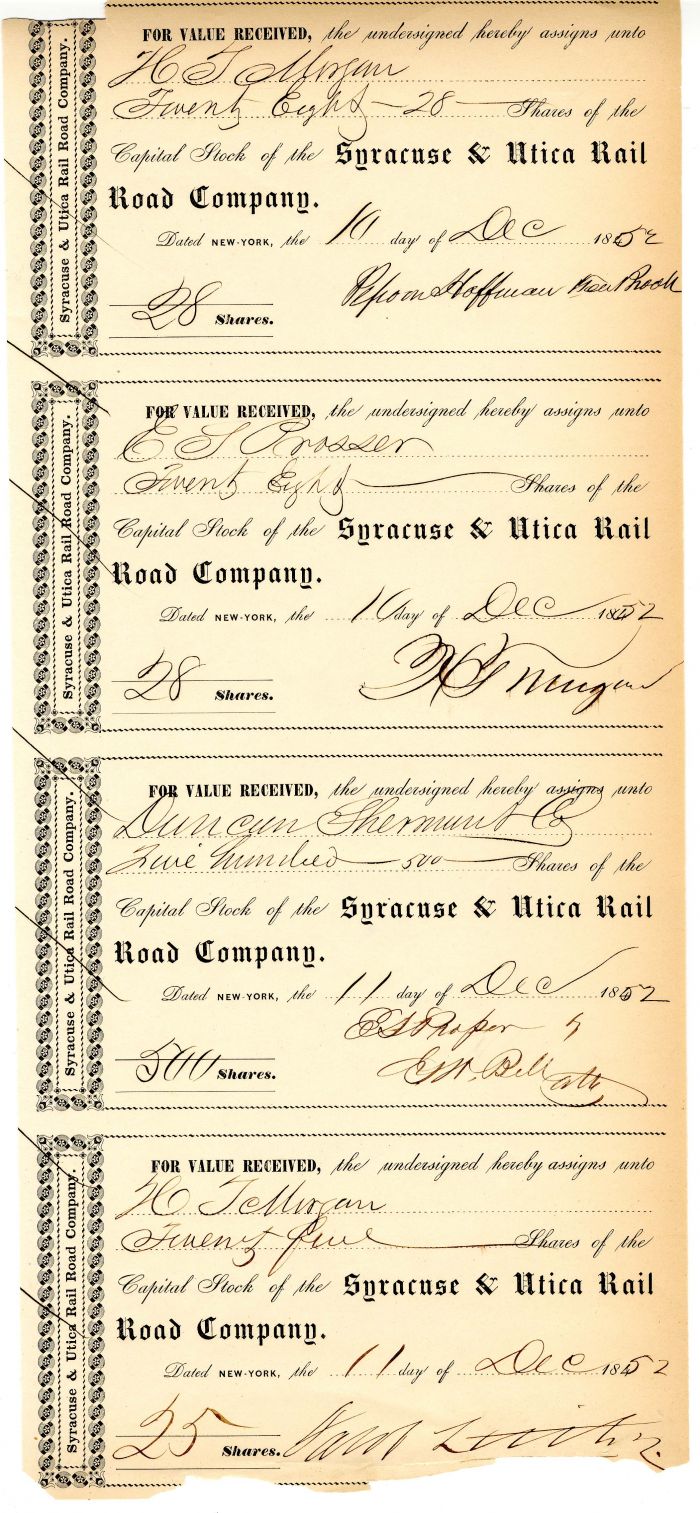Sheet of 4 Transfers signed by Jacob Little
Inv# AG2063 Stock
Sheet of 4 Stock Transfers signed by Jacob Little. Rare!

Jacob Little Jacob Little originated the daring, dashing style of business in stocks, by which fortunes are made and lost in a day. He was born in Newburyport, Mass., and early exhibited great tact and aptitude for business. In 1817 he came to N.Y., and entered the store of Jacob Barker, who was at that time the most shrewd and talented merchant in the city. He remained with his master 5 years, and completed his financial education. In 1822 he opened an office in a small basement on Wall Street. Caution, self-reliance, integrity, and far-sightedness beyond his years, marked his early career. His ambition was to hold the foremost place in Wall Street. Eighteen hours a day he devoted to business. His evenings he spent in visiting retail houses to purchase uncurrent money. He opened a correspondence with leading bankers in all the principal cities from N.Y. to New Orleans. Twelve years of industry, integrity, and energetic devotion to business placed Mr. Little at the head of financial operations on Wall Street. He identified himself with the style of business known as " Bearing Stocks." He was called the Great Bear on 'change. His mode of business enabled him to roll up an almost untold fortune. He held on to his system till it hurled him down and beat him to pieces. For more than a quarter of a century Mr. Little's office in the old Exchange building was the centre of daring, gigantic speculations. On change his tread was that of a king. He was rapid and prompt in his dealings, and his purchases were usually made with great judgment. He controlled so large an amount of stock that he was called the Napoleon of the Board. When capitalists regarded railroads with distrust, he put himself at the head of the railroad movement. He comprehended the profit to be derived from their construction. In this way he rolled up an immense fortune, and was known everywhere as the Railway King. He was the first-to discover when the business was overdone, and immediately changed his course. At this time the Erie was a favorite stock, and was selling at par. Mr. Little contracted to sell a large amount of this stock, to be delivered at a future day. His rivals on Wall Street, anxious to floor him, formed a combination. They took all the contracts he offered, bought up all the new stock, and placed everything out of Mr. Little's reach, making it, as they thought, impossible for him to carry out his contracts. His ruin seemed inevitable, as his rivals had both his contract and the stock. The morning dawned when the stock must be delivered, or the Great Bear of Wall Street break. At one o'clock he entered the office of the Erie company. He presented certain certificates of indebtedness which had been issued by the corporation. By those certificates the company had covenanted to issue stock in exchange. That stock Mr. Little demanded. Nothing could be done but to comply. With that stock he met his contract, floored the conspirators, and triumphed. Walking from Wall Street with a friend one day they passed through Union Square, then the abode of our wealthiest people. Looking at the rows of elegant houses, Mr. Little remarked, "I have lost money enough today to buy this whole square. Yes," he added, "and half the people in it." Three times he became bankrupt. In each failure he recovered, and paid his contracts in full. It was a common remark among the capitalists, that " Jacob Little's suspended papers were better than the checks of most men." His personal appearance was commanding. He was tall and slim; his eye expressive; his face indicated talent; the whole man inspired confidence. He was retiring in his manner, and quite diffident except in business. He was generous as a creditor. If a man could not meet his contracts, and Mr. Little was satisfied that he was honest, he never pressed him. After his first suspension, though legally free, he paid every creditor in full, though it took nearly a million dollars. He was a devout member of the Episcopal Church. his charities were large, unostentatious, and limited to no sect. The Southern Rebellion swept away his remaining fortune, yet, without a murmur, he laid the loss on the altar of his country. He died in the bosom of his family. His last words were, * I am going up. Who will go with me ? "
A stock certificate is issued by businesses, usually companies. A stock is part of the permanent finance of a business. Normally, they are never repaid, and the investor can recover his/her money only by selling to another investor. Most stocks, or also called shares, earn dividends, at the business's discretion, depending on how well it has traded. A stockholder or shareholder is a part-owner of the business that issued the stock certificates.









Ebay ID: labarre_galleries